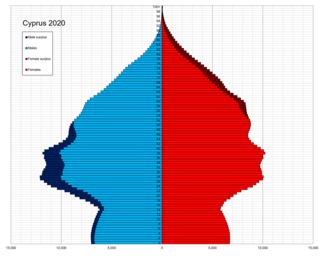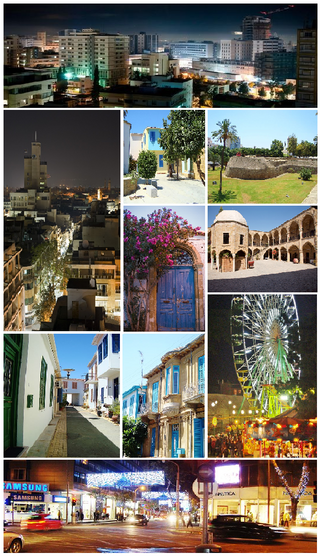
Cyprus, officially the Republic of Cyprus, is an island country located south of the Anatolian Peninsula in the eastern Mediterranean Sea. Its continental position is disputed; while it is geographically in Western Asia, its cultural ties and geopolitics are overwhelmingly Southeastern European. Cyprus is the third-largest and third-most populous island in the Mediterranean. It is located north of Egypt, east of Greece, south of Turkey, and west of Lebanon and Syria. Its capital and largest city is Nicosia. The northeast portion of the island is de facto governed by the self-declared Turkish Republic of Northern Cyprus, which was established after the 1974 invasion and which is recognised as a country only by Turkey.

The people of Cyprus are broadly divided into two main ethnic communities, Greek Cypriots and Turkish Cypriots, who share many cultural traits but maintain distinct identities based on ethnicity, religion, language, and close ties with Greece and Turkey respectively. Before the dispute started in 1964 the peoples of Cyprus were dispersed over the entire island.

Nicosia is the largest city, capital, and seat of government of Cyprus. It is located near the centre of the Mesaoria plain, on the banks of the River Pedieos.

Limassol is a city on the southern coast of Cyprus and capital of the district with the same name. Limassol is the second largest urban area in Cyprus after Nicosia, with an urban population of 183,658 and a metropolitan population of 239,842.

The Cyprus problem, also known as the Cyprus dispute, Cyprus issue, Cyprus question or Cyprus conflict, is an ongoing dispute between Greek Cypriots in the south and Turkish Cypriots in the north. Initially, with the occupation of the island by the British Empire from the Ottoman Empire in 1878 and subsequent annexation in 1914, the "Cyprus dispute" was a conflict between the Turkish and Greek islanders.

Northern Cyprus, officially the Turkish Republic of Northern Cyprus, is a de facto state that comprises the northeastern portion of the island of Cyprus. Recognised only by Turkey, Northern Cyprus is considered by the international community to be part of the Republic of Cyprus.
Turkish Cypriots or Cypriot Turks are ethnic Turks originating from Cyprus. Following the Ottoman conquest of the island in 1571, about 30,000 Turkish settlers were given land once they arrived in Cyprus. Additionally, many of the island's local Christians converted to Islam during the early years of Ottoman rule. Nonetheless, the influx of mainly Muslim settlers to Cyprus continued intermittently until the end of the Ottoman period. Today, while Northern Cyprus is home to a significant part of the Turkish Cypriot population, the majority of Turkish Cypriots live abroad, forming the Turkish Cypriot diaspora. This diaspora came into existence after the Ottoman Empire transferred the control of the island to the British Empire, as many Turkish Cypriots emigrated primarily to Turkey and the United Kingdom for political and economic reasons.

The Turkish invasion of Cyprus began on 20 July 1974 and progressed in two phases over the following month. Taking place upon a background of intercommunal violence between Greek and Turkish Cypriots, and in response to a Greek junta-sponsored Cypriot coup d'état five days earlier, it led to the Turkish capture and occupation of the northern part of the island.
The Turkish people, or simply the Turks, are the world's largest Turkic ethnic group; they speak various dialects of the Turkish language and form a majority in Turkey and Northern Cyprus. In addition, centuries-old ethnic Turkish communities still live across other former territories of the Ottoman Empire. Article 66 of the Turkish Constitution defines a "Turk" as: "Anyone who is bound to the Turkish state through the bond of citizenship." While the legal use of the term "Turkish" as it pertains to a citizen of Turkey is different from the term's ethnic definition, the majority of the Turkish population are of Turkish ethnicity. The vast majority of Turks are Muslims and follow the Sunni and Alevi faith.
The Turkish Cypriot diaspora is a term used to refer to the Turkish Cypriot community living outside the island of Cyprus.
Turkish Australians or Australian Turks are Australians who have migrated from Turkey or who have Turkish ancestral origins.

The Northern Cyprus national football team represents Northern Cyprus, a de facto country, in association football. They were a member of the New Federations Board for non-FIFA-affiliated nations, until its dissolution in 2013. Northern Cyprus' home stadium is Nicosia Atatürk Stadium in North Nicosia and their head coach is Fırat Canova. They are the current FIFI Wild Cup champions, having won the event in Germany in June 2006. They are also the current ELF Cup champions, having won the event at home in November 2006.

British Turks or Turks in the United Kingdom are Turkish people who have immigrated to the United Kingdom. However, the term may also refer to British-born persons who have Turkish parents or who have a Turkish ancestral background.

The Security Forces Command is the military and security force of the unrecognized Turkish Republic of Northern Cyprus.
Several distinct periods of Cypriot intercommunal violence involving the two main ethnic communities, Greek Cypriots and Turkish Cypriots, marked mid-20th century Cyprus. These included the Cyprus Emergency of 1955–59 during British rule, the post-independence Cyprus crisis of 1963–64, and the Cyprus crisis of 1967. Hostilities culminated in the 1974 de facto division of the island along the Green Line following the Turkish invasion of Cyprus. The region has been relatively peaceful since then, but the Cyprus dispute has continued, with various attempts to solve it diplomatically having been generally unsuccessful.

Crombrugghia is a genus of moths in the family Pterophoridae. It was erected by James William Tutt in 1906.

Crombrugghia distans, also known as the Breckland plume is a moth of the family Pterophoridae found in Africa, Asia and Europe. It was first described by Philipp Christoph Zeller in 1847.
Crombrugghia kollari is a moth of the family Pterophoridae. It is found in Spain, Italy, France, Austria and Switzerland and has also been recorded from southern Russia and Turkey. It is an Alpine species.
Turkish Cypriot nationalism is an ethnic nationalism supporting the independence of the Turkish Republic of Northern Cyprus (TRNC) and mostly desires that the TRNC stay independent from Turkey while opposing the idea of a united Cyprus with the Greek-dominated Republic of Cyprus. The objective of taksim, that is, the partition of the island of Cyprus into Turkish and Greek portions, is widespread among Turkish Cypriot nationalists. Nevertheless, a considerable number of them wish for Turkey to annex Cyprus.










